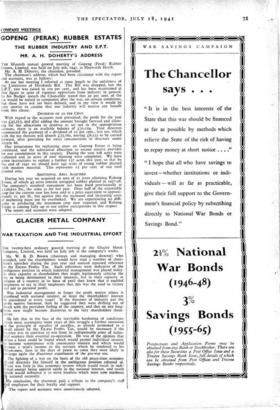GLACIER METAL COMPANY
WAR TAXATION AND THE INDUSTRIAL EFFORT
THE twenty-first ordinary general meeting of the Glacier Metal Company, Limited, was held on July 9th at the company's works.
Mr. W. B. D. Brown (chairman and managing director) who presided, said the shareholders would have read a number of chair- men's speeches during the past year and noticed repeated reference to the Excess Profits Tax. Such references were indicative of the ambiguous position in which industrial management was placed today. In their capacity as shareholders they might legitimately criticise the tax as being detrimental to their interests, but in their capacity as citizens of a country in its hour of peril they knew that it enabled employers to say to their employees that this was the road to victory and not to personal profit.
Was industrial management to forget the profit motive where it interfered with national interest, or must the shareholders' interest be considered at every stage? If the directors of industry put the profit motive foremost, then he suggested they were drifting out of touch with the prevalent feeling of the country, and that on any long- term view might become disastrous to the very shareholders them- selves.
He felt that in the face of the inevitable hardening of conditions thick must accompany more years of this struggle a further extension of the principle of equality of sacrifice, as already promoted to a small extent by the Excess Profits Tax, would be necessary if the mintry was to continue to win from its indispensable army of indus- trial workers their essential co-operation. He was of the opinion that uress a basis could be found which would permit individual interest to become synonymous with community interest and which would harness a man's income to the services which he rendered to his fellow-men, then in the days of peace to come they were likely to tin iergo again the disastrous experiences of the pre-war era.
The fighting of a war on the basis of the old peace-time economy placed directors like himself in the ambiguous position referred to. 7:1,ere was little in this economic system which would result in indi- ;idual energy being applied solely in the national interest, and much which would influence it to serve loyalties which were now outshone A! national necessity.
In conclusion, the chairman paid a tribute to the company's staff 5nd employees for their loyalty and support.
The report and accounts were unanimously adopted.

























 Previous page
Previous page